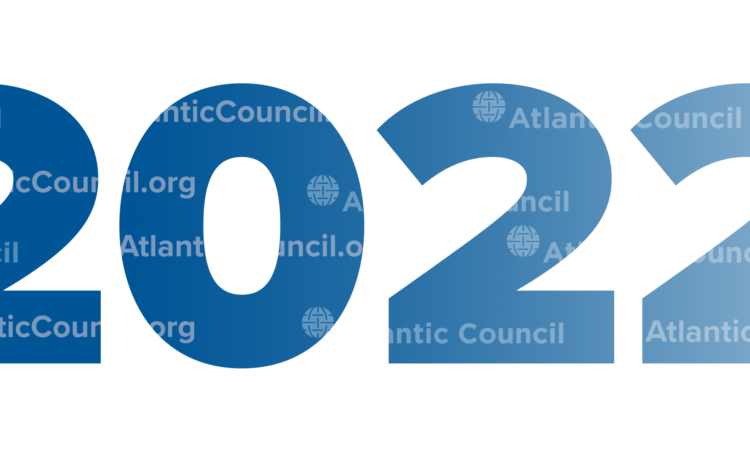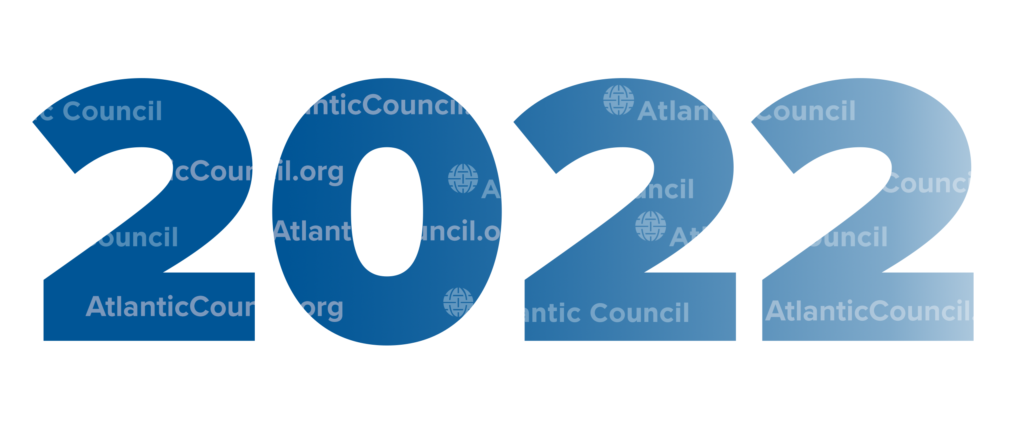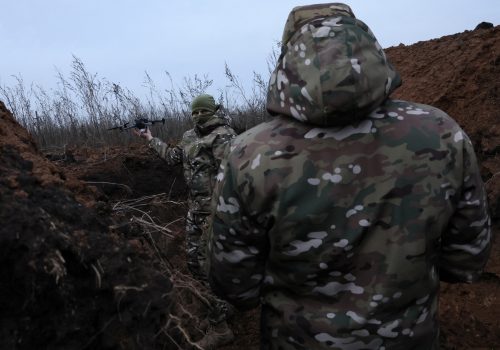
This was an exceedingly difficult year in many ways: War in Eastern Europe, turmoil in the financial markets, and the increasingly evident climate crisis wrought destruction and despair. But decades from now, we may look back on this year as a turning point in democracy’s struggle against autocracy. There’s no way Vladimir Putin, Xi Jinping, or Ali Khamenei is feeling better today about their standing on the world stage—or even their grip on power at home—than they did when 2022 dawned. And while the performance of democracies has been far from perfect, it’s been heartening to see democratic allies and partners coming together to deliver for their publics and defend their values.
This has also been the most successful year in the Atlantic Council’s sixty-one-year history when measured by our growth, our impact, and our high-quality work. I’m immensely proud of the following twenty-two highlights for 2022 across our sixteen programs and centers. Our work to help inform policymakers and the public as we craft solutions to the world’s most difficult challenges has never felt more urgent. And we can’t wait to deliver even more on that mission in 2023.
1. Our Atlantic Council-wide work on Russia’s war against Ukraine
The Eurasia Center’s leadership on Ukraine goes back many years and made us uniquely well-positioned to respond to Putin’s February invasion, both in moving policymakers to action and educating the public on the state of the war and Ukraine’s needs. What set the Council’s work apart from all others, however, was the power of its cross-program collaboration with the Scowcroft Center for Strategy and Security (military strategy), the GeoEconomics Center (sanctions), the Digital Forensic Research Lab (digital and cyber dangers), the Europe Center, and the Global Energy Center all joining our offensive.
2. The Freedom and Prosperity Center and its indexes
This year featured the launch of the Council’s Freedom and Prosperity Center, which developed ground-breaking indexes showing the relationship between freedom and prosperity, with a particular focus on emerging markets. This Big Story breaks down our in-depth research in an accessible way, with striking visuals to tell the story of how freer countries prosper in all sorts of measurable ways.
3. The Distinguished Leadership Awards
The war hung over our Distinguished Leadership Awards this May, known as Washington’s Oscars, where we honored the Ukrainian people for their bravery, Ukrainian singer Jamala, then-Italian Prime Minister Mario Draghi, and ENI CEO Claudio Descalzi. It was a powerful way to return to high-end convening after COVID-19 disruptions, made all the more compelling by a special message from Ukrainian President Volodymyr Zelenskyy, praising several of his country’s individual heroes. It was an unforgettable night.
4. Our dinner for African leaders
In December, the Africa Center hosted ten African presidents and prime ministers for a glittering welcome dinner at the Renwick Gallery on the eve of the US-Africa Leaders Summit. The dinner demonstrated the Africa Center’s leadership and expertise, while supporting its work on prosperity, the rule of law, creative and cultural industries, and Global Africa.
5. Our innovative trackers
This was the year when the Atlantic Council used trackers and data visualization more powerfully than ever before. Our experts created proprietary features that tracked everything from the growth of central bank digital currencies to global economic sanctions to Western aid to Ukraine and NATO’s forward presence. This kind of living research helps establish the Council as the authority in critical areas.
6. “Owning” NATO enlargement to Finland and Sweden
The Transatlantic Security Initiative in the Scowcroft Center led the charge on analysis and advice as Finland and Sweden sought to join NATO—from public events and private briefings to op-eds and in-depth research. Our team has briefed the US government, NATO, private industry, and the governments of Finland and Sweden directly with recommendations that both countries are already implementing. We co-hosted the NATO Public Forum at the Madrid NATO Summit, and then we honored Finnish and Swedish leaders at our Global Citizen Awards dinner on the margins of the United Nations (UN) General Assembly in New York.
7. Our Russian War Reports
This year the Digital Forensic Research Lab launched regular Russian War Reports, which reoriented our whole Russia-focused team and resulted in more than seventy editions. In the lead-up to and during the war, we built a comprehensive record of aggression against Ukraine. These monitoring reports are organized around verifying the worst of war, documenting Russian influence operations, and depicting cyber and digital domains as precedent-setting theaters of the conflict.
8. The EU-US Defense and Future Forum
The Europe Center’s EU-US Defense and Future Forum, one of the Council’s first day-long hybrid convenings since the pandemic, brought together senior US and European decisionmakers and thought leaders—including the deputy US secretary of state, secretary general of the European External Action Service, and more—to support and build on the unprecedented unity between the United States and European Union in their response to Russia’s war against Ukraine.
9. The Atlantic Council Global Energy Forum
Convening in person for the first time since the start of the COVID-19 pandemic, the 2022 Global Energy Forum brought global leaders in the energy sector to Dubai in March. The Global Energy Center’s flagship annual event, which always draws a high-level guest list, helped to advance a cohesive international response to the crisis in Ukraine within weeks of Russia’s invasion.
10. The Atlantic Council Global Food Security Forum
Our Global Food Security Forum in Bali was a unique undertaking in several respects: our first convening in Indonesia, our first official sideline event at the Group of Twenty (G20), and our first major move into food security issues. With just a couple months’ notice, the Scowcroft Center and the broader Council team pulled off a world-class gathering—including a closing concert with John Legend that Indonesian President Joko Widodo attended in its entirety. With Putin weaponizing food security, it was a compelling way to garner global attention.
11. The N7 Conference
In December, the N7 Initiative held the N7 Conference on Education and Coexistence in Rabat, Morocco—the first in a series of upcoming subject-matter conferences in the region aimed at producing actionable policy recommendations to broaden and deepen regional ties between Israel and Arab countries. These conferences, which started in 2021, gather government, civil society, and academic leaders from Israel, the United Arab Emirates, Bahrain, Morocco, Sudan, Egypt, and Jordan, along with US policymakers who work with participants to identify initiatives that Washington can support. As part of our growing body of work around the Abraham Accords, the Council is playing a critical convening role for these vital, but sensitive, discussions.
12. Our COP27 coverage
At a historic UN Climate Change Conference of the Parties (COP27) in Egypt, where the Global South was at the forefront of the conversation like never before, our Global Energy Center and Adrienne Arsht-Rockefeller Foundation Resilience Center partnered up to help transform the global climate and energy dialogue. In addition to providing agenda-setting analysis, our teams showcased the Council’s bipartisan strength by hosting a private roundtable with congressional Republicans and an Atlantic Council Front Page event featuring US House Speaker Nancy Pelosi (D-CA).
13. Major conferences in Frankfurt and London
This year, the GeoEconomics Center went global. In April, our team traveled to London to launch major new research on the future of UK banking and finance at a high-level conference in the magnificent confines of Banqueting House, in the heart of Westminster. Then in September, the Center held the inaugural Frankfurt Forum on US-EU GeoEconomics, in collaboration with German think tank Atlantik Brücke. Some of the most influential policymakers from both sides of the Atlantic came to discuss the findings of our four original reports and hear European Central Bank President Christine Lagarde’s thoughts on the fallout of Russia’s war in Ukraine and the future of dollar and euro.
14. Our events with finance ministers for India and Pakistan
During the International Monetary Fund and World Bank meetings this spring, our South Asia Center and GeoEconomics Center hosted Indian Finance Minister Nirmala Sitharaman and then Pakistani Finance Minister Miftah Ismail. These events reinforced the value of US and Western engagement with South Asia in areas other than security and defense. The fact that these two top officials made appearing at the Council a priority during their Washington visits also showcased our growing leadership in the US-South Asia policy ecosystem. Overall, nearly a dozen finance ministers and central bank governors visited our office during IMF-World Bank week.
15. Janet Yellen’s landmark speech
In April, we hosted US Treasury Secretary Janet Yellen for a major speech on international economics as part of the Atlantic Council Front Page series. The Treasury Department chose the Atlantic Council for its convening power and the GeoEconomics Center for its substantive work on sanctions, trade, and reform of the Bretton Woods system. It was the secretary’s first major international economics speech in Washington.
16. Gina Raimondo’s China discussion
The Global China Hub hosted US Secretary of Commerce Gina Raimondo for an Atlantic Council Front Page event in September shortly after passage of the landmark CHIPS and Science Act. Raimondo laid out her vision for the Commerce Department’s leading role in the Biden administration’s unfolding competitive policy with China, underscored just days later by expanded export controls on semiconductor technology. The event also raised the profile of the Global Tech Security Commission, a partnership between the China Hub and the Krach Institute for Tech Diplomacy at Purdue.
17. Our AI Connect workshop
In July, the GeoTech Center and Adrienne Arsht Latin America Center hosted a regional meeting of the AI Connect program, featuring forty rising professionals from academia, civil society, industry, and governments from Latin America who participated in panels on artificial intelligence (AI) policy, engaged in design thinking workshops, expanded their networks of policy professionals, and became better prepared to promote and advance the responsible development and use of AI across the region.
18. The world’s first named heat wave
To raise awareness of the increasing and deadly nature of climate-driven extreme heat, the Adrienne Arsht-Rockefeller Foundation Resilience Center partnered with the City of Seville and built a system that resulted in the world’s first officially named heat wave in July: Heat Wave Zoe.
19. Making progress at the UN on human rights in Iran
The women-led revolution in Iran—and the Islamic Republic’s subsequent crackdowns on protestors—provided momentum for meaningful action at the UN. After hosting an event with UN Human Rights Council President Federico Villegas, our Strategic Litigation Project, housed within the Middle East Programs, spearheaded an extensive advocacy campaign that helped accomplish two landmark goals—the establishment of an independent UN fact-finding mission on the human rights situation in Iran and the Islamic Republic’s removal from the UN Commission on the Status of Women. Meanwhile, our team was at the forefront of telling the story behind the protests, with Holly Dagres’ report “Iranians on #SocialMedia” putting the Council ahead of the curve.
20. Our Caribbean Financial Inclusion Task Force
This year the Adrienne Arsht Latin America Center took on a challenge that hadn’t seen policy action in years: financial inclusion in the Caribbean. By working throughout the year as a resource for Congress, the Caribbean Initiative’s Financial Inclusion Task Force helped bring about a US House hearing in September, featuring testimony from the Council’s Wazim Mowla.
21. Atlantic Council IN TURKEY’s Congressional-Parliamentary Fellowship Program
The Atlantic Council IN TURKEY’s Congressional-Parliamentary Fellowship Program connected advisors and staffers from the US Congress and Turkish Parliament to build dialogue and mutual understanding in both legislative bodies through a multifaceted curriculum of lectures and capstone study trips to the United States and Turkey. The first-of-its-kind program reiterated the constructive role the Atlantic Council plays through its Turkey program to support the sometimes-troubled transatlantic relationship with a crucial NATO ally.
22. The Millennium Fellows Alumni Board
This year the Millennium Leadership Program—which fosters future leaders from around the world—launched the Millennium Fellows Alumni Board, a great testament to the groundswell of energy coming from our alumni community. This fellow-led initiative focuses on strengthening the alumni community, advancing alumni leadership learning, and strengthening our collective impact.





